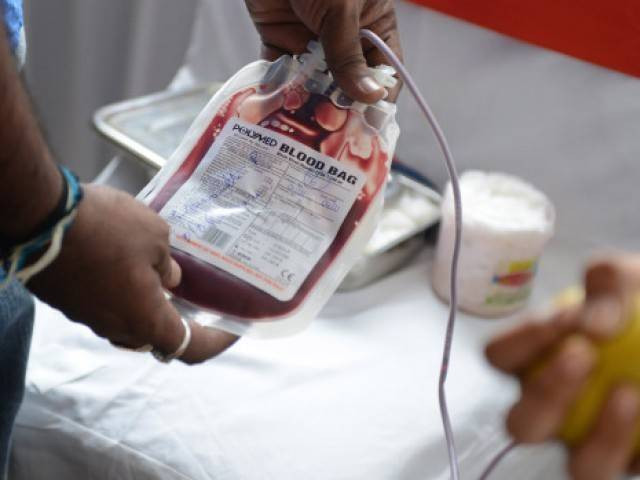Health officials learn how to set up blood donor systems
Experts say quality of donors needs to be better

Experts say quality of donors needs to be better. PHOTO: FILE
The workshop was organised by the World Health Organization and the Safe Blood Transfusion Programme. It was facilitated by international experts in the field including the University of Groningen Donor Healthcare Professor Wim de Kort, Austria Donor Department Chief Dr Eberhart Lars, WHO-EMRO in Egypt Blood Safety Unit Head Dr Yetmgeta Abdella and national experts, Professor Hasan Abbas Zaheer and Dr Noaman Siddiqui.
The government had set up the Safe Blood Transfusion Programme in 2010 to provide safe blood products. In the first phase of the German-funded project was completed in 2016 under which new blood transfusion infrastructure has been created consisting of 10 modern Regional Blood Centres and refurbishment of 60 existing hospital blood banks. In the second phase, the coverage would be further expanded.
To derive maximum benefit from this new infrastructure, it is essential that the quality of the blood donors is the optimum, said Safe Blood Transfusion Programme National Coordinator Hassan Abbas Zaheer, adding that the organization of the Blood Donor Management system on modern lines was critical.
He detailed that an estimated 3.5 million units of blood are collected every year in Pakistan, of which only 11 per cent are donated by voluntary, unpaid blood donors from low-risk populations.
“Proper system of donor care, notification, counselling and referral are not available. Reliance is thus largely on family replacement donors.
This needs to be replaced by a regular, voluntary blood donation system which is the internationally recommended strategy,” Zaheer said, adding, “It is the safest way to ensure the continuity, sufficiency, sustainability and security of blood supplies and is based on the principle of voluntary non-remunerated donations of blood and blood components by a pool of regular blood donors from low-risk populations.”
The speakers said sustainable donor education, motivation, mobilization and retention programme, safe blood collection process, including donor selection and deferral, donor care, notification, counselling, referral, and confidentiality are the foundations of a such a blood donor management programme.
The two-day training provided updated information on the essential components of blood donor management system including infrastructure requirement for blood donor management, establishing and maintaining blood donor base, donor recruitment and retention strategies, safe blood collection techniques, blood donor counselling, referral and care, human resources management, information technology, and ethical considerations in blood donor management.
The participants also deliberated on recommendations and future plans to improve blood donor management system and practices in the country, especially in the newly constructed German-funded Regional Blood Centres.
Published in The Express Tribune, December 20th, 2017.



















COMMENTS
Comments are moderated and generally will be posted if they are on-topic and not abusive.
For more information, please see our Comments FAQ